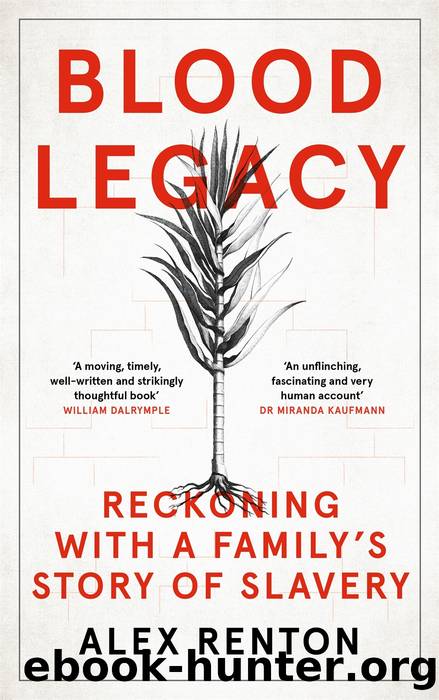Blood Legacy by Alex Renton

Author:Alex Renton
Language: eng
Format: epub
ISBN: 9781786898876
Publisher: Canongate Books
_________________
* A common problem among enslaved people on the plantations, often blamed on witchcraft and sometimes savagely punished. Soil-eating is now recognised as a mental health condition and known as pica. It is brought on by stress and emotional trauma.
CHAPTER 11
THE END OF THE BRITISH TRADE
A superannuated planter
As the nineteenth century began, Sir Adam was ageing. He complains frequently of his gout and bowel afflictions; he has trouble with his teeth and then with the dentures (made by a celebrated physician in Paris) that replace them. Retired from Parliament in 1796, he is still busy, though he seems less certain in his dealings with the plantation and its problems. His concern as his eighth decade begins is to put his Scottish estates in good order for the nephew he has designated his heir â James, his brother Charlesâs son. Another project is a legal challenge to obtain the title Earl of Glencairn for succeeding Fergusson generations.
Sir Adam writes twice a month or more in this period to âdear Jamesâ. This favoured nephew had returned from Calcutta, aged thirty-two, in 1797, in order to marry and prepare to take over as head of the family. The letters are kindly, full of advice on life, the management of money, health, friendship and so on. There is some political gossip (Jamesâs account of the scandal around Lady Hamiltonâs adultery with Admiral Nelson raises Sir Adamâs eyebrows in 1804). Sir Adamâs letters often end with âlove to the little onesâ, about whose health he worries. There is little talk of business and none at all of slavery or sugar.
The letters show a warm side of the man that is not, naturally enough, evident in any of his business correspondence. The family appear to love him back; they can laugh a little at him. In 1803 his sister Helen, Lady Hailes, writes to her nephew and son-in-law James warning that Sir Adam may be lonely: he has invited all the family to visit Kilkerran. Will we âever get away?â, she wonders: âSir Adam seems to wish and expect never to be left alone and certainly it will be the duty of some of us to be always with him.â 1 His sister Jean was indeed always with him until she died in 1804.
Sir Adam can be passionate, too, in pursuing the righting of a perceived wrong, either to the family or to those less fortunate whom he deems worthy. This tendency appears once or twice in the Jamaica letters, but only on behalf of his white workers, such as the ploughman David Dunbar. He died after a few yearsâ work at Rozelle, and left £40 to his mother back in Ayrshire. Sir Adam is furious when he discovers that the Jamaican executors have not paid the sum to âthis poor familyâ and pesters until that happens. Compassion for the enslaved people is conspicuously lacking, by contrast, beyond the very occasional qualms he expresses about separating families.
Seen through the letters to his family and to friends
Download
This site does not store any files on its server. We only index and link to content provided by other sites. Please contact the content providers to delete copyright contents if any and email us, we'll remove relevant links or contents immediately.
| Africa | Americas |
| Arctic & Antarctica | Asia |
| Australia & Oceania | Europe |
| Middle East | Russia |
| United States | World |
| Ancient Civilizations | Military |
| Historical Study & Educational Resources |
The Dawn of Everything by David Graeber & David Wengrow(1707)
The Bomber Mafia by Malcolm Gladwell(1622)
Facing the Mountain by Daniel James Brown(1553)
Submerged Prehistory by Benjamin Jonathan; & Clive Bonsall & Catriona Pickard & Anders Fischer(1455)
Wandering in Strange Lands by Morgan Jerkins(1430)
Tip Top by Bill James(1416)
Driving While Brown: Sheriff Joe Arpaio Versus the Latino Resistance by Terry Greene Sterling & Jude Joffe-Block(1376)
Red Roulette : An Insider's Story of Wealth, Power, Corruption, and Vengeance in Today's China (9781982156176) by Shum Desmond(1359)
Evil Geniuses: The Unmaking of America: A Recent History by Kurt Andersen(1353)
The Way of Fire and Ice: The Living Tradition of Norse Paganism by Ryan Smith(1336)
American Kompromat by Craig Unger(1315)
F*cking History by The Captain(1304)
It Was All a Lie by Stuart Stevens;(1300)
American Dreams by Unknown(1286)
Treasure Islands: Tax Havens and the Men who Stole the World by Nicholas Shaxson(1273)
Evil Geniuses by Kurt Andersen(1257)
White House Inc. by Dan Alexander(1212)
The First Conspiracy by Brad Meltzer & Josh Mensch(1174)
The Fifteen Biggest Lies about the Economy: And Everything Else the Right Doesn't Want You to Know about Taxes, Jobs, and Corporate America by Joshua Holland(1126)
